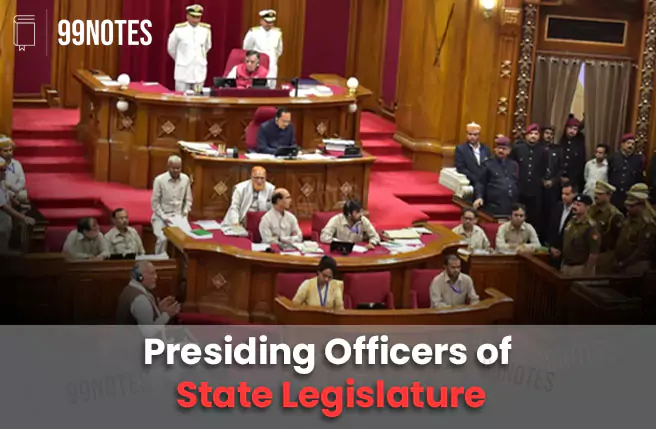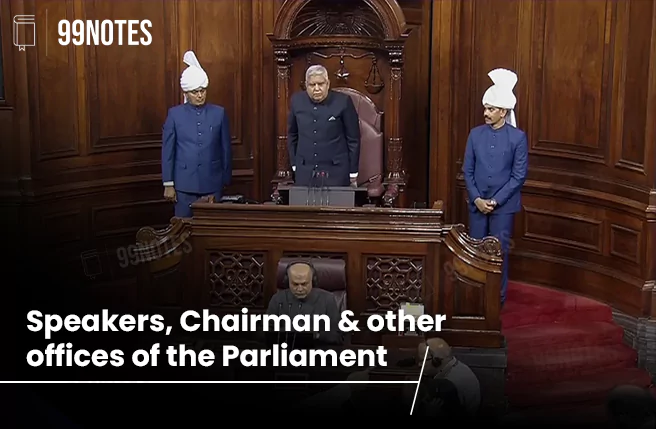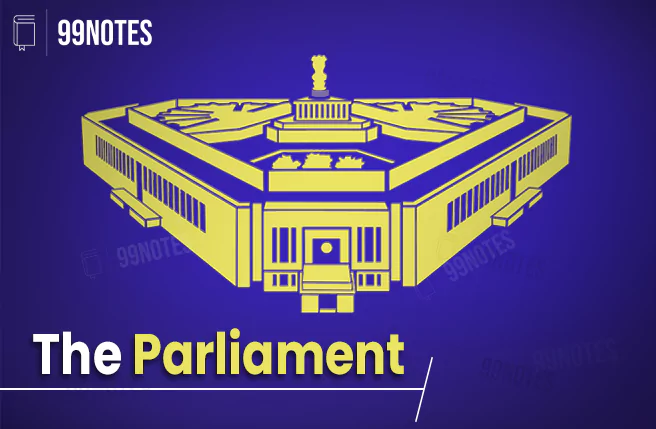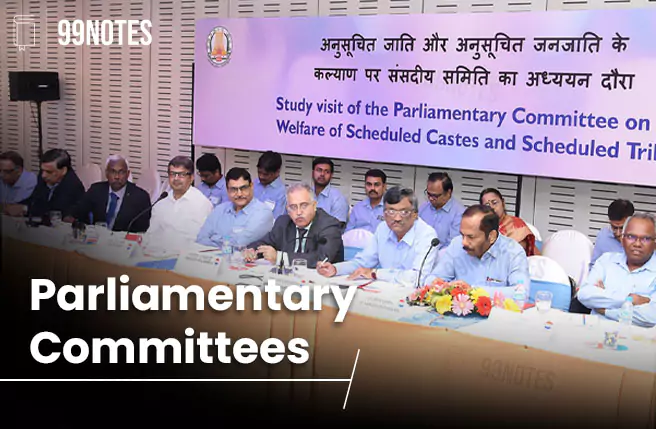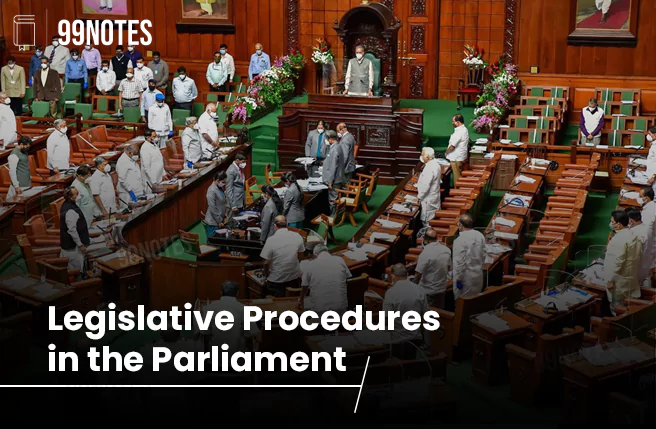Presiding Officers of State Legislature – UPSC Notes
Both houses of the state legislature have a presiding officer; the state assembly has a Speaker as the principal presiding officer and a deputy speaker to assist them and preside over the chair in their absence.
Similarly, the legislative Council (in the case of a bicameral legislature is presided over by the Chairman (Chairperson) and assisted by the deputy chairperson, who performs the duties of the Chairperson in their absence.
Besides them, there is also a panel of chairpersons in the Assembly and a panel of vice-chairpersons in the Council.
Speaker of Legislative Assembly
The Speaker is the principal presiding officer in the State Legislative Assembly. S/he works non-partisanly and is the guardian of the House’s customs, powers and privileges and its members.
Election and Term
- The Speaker is elected by the state assembly amongst its members (after its first sitting).
- The date of election is determined by the Governor.
- The term of the assembly speaker is co-terminus with the life of the Legislative Assembly.
Remuneration
The state legislature determines the salary and allowances of the Speaker and deputy speaker. They are charged on the consolidated fund of states; hence, it is not subject to the vote of the state assembly.
Vacation of Office
The office of the Speaker can be vacant in the following cases:
- If s/he is no longer a member of the Assembly.
- If s/he resigns from the office by addressing the resignation letter to the deputy speaker.
- On their removal by a resolution passed by the majority of all the members of the Assembly (Effective majority). Such a resolution can be moved only by giving 14 days’ notice.
Roles, Powers and Function of the Speaker
The Speaker is the head and the chief spokesperson of the Assembly. Besides presiding over the proceedings of the House, the Speaker is vested with various other powers and responsibilities, which have been discussed below.
- Presides over the meetings: The Speaker presides over the proceedings of the House and conducts meetings. S/he can allow secret meetings of the House at the request of the leader of the House.
- Maintains discipline and decorum of the House: S/he maintains discipline and decorum in the House. S/he can ask a member to leave the House or even suspend him/her.
- Interpreter of Provisions related to the House: S/he is the final interpreter of the Constitution, Rules of procedure of the conduct of the legislature and conventions and precedents related to the Assembly. Their decision is final in this matter.
- Maintains Quorum: S/he can adjourn the House or suspend the meeting of the House in case of absence of the quorum of the House, i.e. 1/10th of the strength of the House.
- Casting Vote: S/he does not vote in the first instance but can cast a vote in case of a tie.
- Certification of the Money Bill: The Speaker certifies whether the bill is a money bill or not. Their decision is final in this matter.
- Disqualification of members: She also adjudicates the Disqualification of the members on account of defections under the 10th schedule of the Constitution.
- Legislative Committees: S/he appoints the chairpersons of the committees of the Assembly of the lower House and oversees the functioning of these committees. The Speaker himself/herself is the Chairperson of the following committees of the Assembly:
-
- Business Advisory Committee
- General Purpose Committee
- Rules Committee
Deputy Speaker of the Legislative Assembly
The deputy speaker assists the Speaker in the discharge of their duties and also presides over the proceedings of the House in the absence of the Speaker. The post of deputy speaker is not subordinate to the Speaker.
Election, Term and Removal of the Deputy Speaker
- Similar to the Speaker, the deputy speaker is also elected by the Assembly from amongst its members after the election of the Speaker has occured.
- The date of their election is fixed by the Speaker.
- The term, process of removal and provisions related to the vacancy of their office are similar to that of the Speaker.
Panel of Chairpersons in Assembly
- The Speaker nominates the panel of chairpersons amongst its members to assist the Speaker and deputy speaker.
- The member of the panel will have the same powers as the Speaker while presiding over the House.
Chairperson of Legislative Council
- The member of the Council itself elects the Chairperson of the Council.
- Powers and functions: As the presiding officer of the Council, their powers and functions are comparable to those of the Speaker of the Assembly. However, in some areas, the Speaker has special powers; for example- It is the Speaker who certifies whether a bill is a money bill or not.
Remuneration
The salary and allowances of the Chairperson and deputy chairman of the Legislative Council are fixed by the legislature. They are charged on the consolidated fund of states; hence, it is not subject to the vote of the state assembly.
Vacation of Office
The office of the Chairperson of the Legislative Council can be vacant in the following cases:
- If s/he is no longer a member of the Council.
- If s/he resigns from the office by addressing the resignation letter to the deputy chairperson.
- On their removal by a resolution passed by the majority of all the members of the Council (Effective majority). Such a resolution can be moved only by giving 14 days’ notice.
| Comparison with Rajya Sabha Chairperson |
| The post of Chairperson of the Legislative Council is similar to the Rajya Sabha chairperson. However, there are a few distinctions, such as:
1. Unlike the Rajya Sabha Chairperson, who serves a dual role (Chairperson of the Rajya Sabha and Vice-President), the Chairperson of the Legislative Council has no such role. 2. Unlike the Rajya Sabha chairperson, the Chairperson of the Legislative Council is a member of the Council. 3. When a resolution for the Rajya Sabha Chairperson’s removal is under consideration, s/he, though allowed to participate and speak, is not entitled to vote in such circumstances. However, the Chairperson of the Legislative Council can vote in such a scenario. |
Deputy Chairperson of the Legislative Council
- The Council elects the deputy chairman from amongst its members.
- S/he can be removed by passing a resolution by the majority of all members of the House (Effective majority). The resolution to remove the deputy chairperson can be brought after giving 14 days’ notice.
Power and Functions
- The deputy chairperson performs the duties of the Chairperson when their office is vacant or during his temporary absence.
- The office of the deputy chairperson is not subordinate to the Chairperson.
Panel of Chairpersons in the Legislative Council
- The Chairperson nominates a panel of chairpersons from amongst its members.
- In the absence of the Chairperson or Deputy Chairperson, any of them can preside over the House.
- While presiding over the House, they assume the same powers as the Chairperson and Deputy Chairperson.

